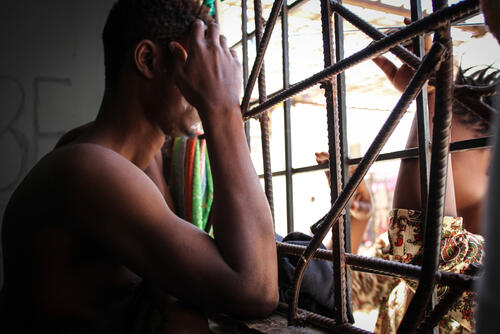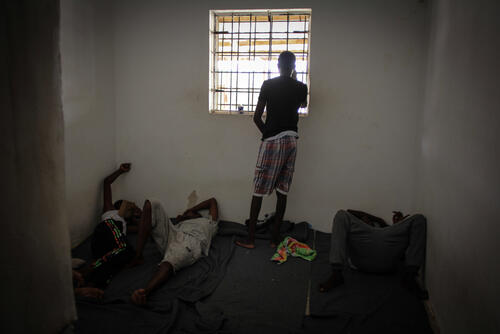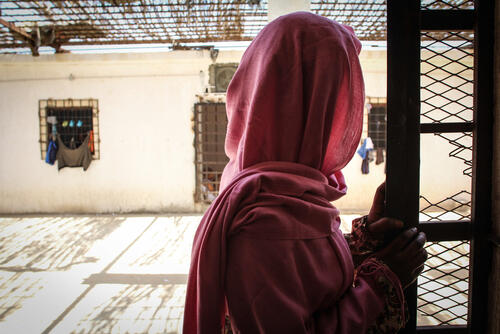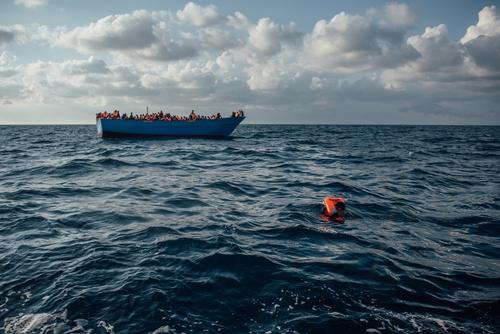In the wake of French President Emmanuel Macron outlining his vision for Europe, MSF Head of Mission for Libya Julien Raickmann has written President Macron an open letter in response, calling out the hypocrisy of such a vision while people are trapped in appalling conditions in detention in Libya, the effect of European migration policies.
This letter originally was published in French in Le Monde Afrique on 14 March, 2019.
Misrata, Libya
Thursday, 14 March 2019
Mr. President,
In response to your call "for a European Renaissance" in which you stated your commitment to “a Europe that protects both its values and its borders”, I take the liberty of addressing you directly to share the consequences I see every day in Libya of the current European policies on migration, and the human and moral sacrifices on which they rest.
I work in Libya for Médecins Sans Frontières. Our teams work in nine detention centres, where refugees and migrants are arbitrarily held in the Tripoli and Misrata regions, trying to cover the medical needs of about 3,000 people. These people are extremely vulnerable, left with no recourse and our presence, as well as those of other humanitarian organisations, barely manages to help them.
The wall erected in the Mediterranean Sea, the lack of places for refugees in host countries… increase the hardship of migrants and refugees and enable a system of human exploitation to operate with impunity.Julien Raickmann
The founding principles of the European Union are grounded in the rejection of violence based on national or religious affiliation. In Libya, however, we see people suffering from arbitrary detention, ill-treatment, malnutrition, torture. Women, infants, and unaccompanied children are held in inhumane conditions, and this is based solely on their origin and administrative status.
The chilling report by the United Nations High Commissioner for Human Rights last December (following a similar report published in 2016), the multiple alerts made by international NGOs including MSF, and media reports have had no impact on the daily realities in Libyan detention centres. The number of migrants in detention is estimated at 5,700. Among them, some 20 percent are women and children and 75 percent are considered as people of concern to UNHCR. They remain in detention for months and left exposed to physical and psychological abuse and sometimes abduction. There is no alternative to detention for these people in Libya.
Given that detention conditions are known and are so unacceptable, why do you keep ensuring that as many people as possible are brought back to Libya, to the country they seek to flee for fear of their lives?Julien Raickmann
I am European myself, and the Europe that is sponsoring these practices is not mine. How many citizens would accept that on their behalf?
The Italian government gave boats to the Libyan coast guard; France announced in February it would do the same. At the very moment of this announcement, on 21 February, I was in Libya and a boat had just been brought back to Khoms after its passengers spent a day and a half at sea. There were 116 people, vulnerable men and women, six children including a six month-old baby. Terrified, starved, suffering from hypothermia. They were all sent to detention amidst chaos and improvisation.
There is an urgent need to stop the return of people to Libya, to welcome more refugees… to allow NGOs to participate in rescue operations at sea, and to contribute to provide alternatives to the arbitrary detention of migrant people in Libya.Julien Raickmann
I hoped the French Minister of Defence, who announced the donation to the Libyan coast guard, could have seen what returning to Libya meant for these people. It is difficult for humanitarian workers to openly speak out, as our limited access to detention centres may be even more restricted as a result. The very words of this letter have been weighed over and over again. We are not authorized to release pictures or footage from Libyan detention centres, and gathering testimonies from people is difficult or sometimes impossible.
Nearly 2,300 people died or went missing in the Mediterranean Sea in 2018, mostly in the waters off Libya. Today, the rescue boats are blocked with administrative and judicial manoeuvres, and the closest safe ports refuse to welcome the survivors any longer - to the extent that some merchant ships sometimes ignore the boats in distress for fears of not being able later on to disembark rescued people. The survivors are systematically brought back to Libya, by the Libyan coast guard or commercial vessels, in violation of international maritime law, international refugee law and the principles of non-refoulement.
Not content to repeat that it cannot accommodate all the misery of the world, Europe creates misery. The wall erected in the Mediterranean Sea, the lack of places for refugees in host countries, the opacity of the detention system in Libya, increase the hardship of migrants and refugees and enable a system of human exploitation to operate with impunity. The Libyan authorities themselves mentioned on several occasions their limited capacity, notably to control what it is happening in some detention centres.
Not content to repeat that it cannot accommodate all the misery of the world, Europe creates misery.Julien Raickmann
It is hardly bearable to hear European officials rejoice at the decrease of the number of arrivals in Europe when we know the reality behind these numbers. You are talking about European revival, but what I see here every day are human rights abuses made in the name of the protection of European borders. Given that detention conditions are known and are so unacceptable, why do you keep ensuring that as many people as possible are brought back to Libya, to the country they seek to flee for fear of their lives? Is it possible to rebuild Europe on such hypocrisy?
Our conclusions are simple, Mr. President; things cannot go on like this. Europe, and France in the first place, endangers lives and denies its principles by continuing this policy. There is an urgent need to stop the return of people to Libya, to welcome more refugees and victims of trafficking currently in Libya, to allow NGOs to participate in rescue operations at sea, and to contribute to provide alternatives to the arbitrary detention of migrant people in Libya.
Julien Raickmann
MSF Head of Mission in Libya






